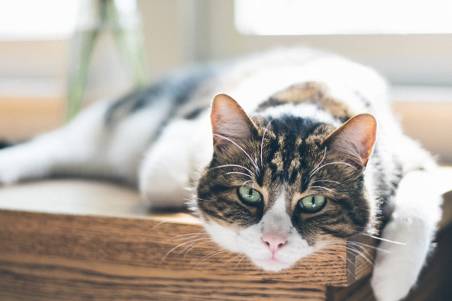Many cat owners believe that if their pets don’t go outside, they won’t get have fleas. Well, this isn’t entirely true, especially if you have some rooms in your that’re rarely used. As such, even if your cat stays indoors throughout the day, they might still face the risk of being attacked by these blood-suckers. This problem isn’t limited to cats alone because other domestic pets may also fall into the same trouble. Of course, you can solve the issue using special flea sprays, but it’d be prudent to find the source of the problem first.
Connect with a verified veterinarian in minutes. Licensed vets are available 24/7 to answer your questions. No need to worry about your furry family member.
Unlike ticks, which go into dormancy during the cold seasons, which fall asleep even in cold weather, fleas are active all year round. They live not only on streets but also in the basements of residential buildings and entrances. They hide in nooks, crannies, and crevices, behind baseboards, in the furniture, folds of linen, carpets, bedding, and the pet’s house. Therefore, explore the common ways your domestic cat can face the flea problem without putting its furry paw behind the threshold.
From this explanation, it’s clear that your indoor cats aren’t as safe as you might have thought. It’s, therefore, imperative that you protect it at all times using methods like a DEWELPRO or sprays. But before you get to the treatment phase, why not work on prevention first? This article aims to cover some of the most common ways your pet can attract ticks within your home.
1. From Another Pet in Your House
This is the most apparent and standard option. If another pet, such as a dog that you regularly walk, lives in your house, it may be a carrier of fleas. In this case, you should put on a flea collar on the dog and use other protective equipment. However, even with a collar, a dog can bring fleas or eggs of these pests into the house. Even with flea and tick remedies applied to your dog, the cat is still not safe, as it takes time for it to take effect, and fleas can be active in the meantime.
The best option, therefore, is to protect both pets. Use all remedies possible on your dog and apply similar tactics on your fur baby. By so doing, you’ll be reducing the chances of flea survival. For instance, if you regularly groom your cat, any fleas brought by your dog will be destroyed they start multiplying.
2. People Can Be the Carriers
Animals aren’t the only ones who can carry fleas. People who come to your home, including you, can also bring the pests, as well as their larvae and eggs. Fleas do not have wings, but they can travel long distances by jumping. Of course, you cannot check clothes and other items for fleas every time a guest enters your home. However, cleaning is enough to get rid of the pests, especially if many guests have visited your house. This is also worth doing if your guests have pets.

Review symptoms, medications & behavior to keep your pets healthy with a Vet Online in just minutes.
Ask a Vet Live Now3. The Source Is New Home
If you moved to a new house, which had previous owners, be prepared for the fact that fleas also could live there beforehand. Flea eggs mature for about a year before they become larvae and then develop into adults. So if the previous owners had pets, eggs could remain after them. In this case, the central salvation from fleas is cleaning. Of course, it is better to process all the possible areas where the insect eggs may be located.
4. After Attending a Vet
Even if your cat’s primary habitat is the house, it will most likely leave home for a regular veterinarian checkup. In such places, there are always a lot of animals that can, among other things, carry fleas or fight them with medical help. It is also possible to run into fleas along the way, as fleas can travel long distances.
The best thing you can do for your pet is to try to prevent fleas. To do this, you can ask your veterinarian which remedies can be used for flea prevention. It would be better if these products were comfortable for the cat and did not provoke pet hair loss. It is much more convenient and safer than treating the cat for fleas later when the pests have already begun to harm it.
5. From Rodents
If you have rodents in your home, they can be the source of fleas. Of course, it doesn’t apply to domestic rodents, which usually live in cages most of the time. If there are rats or mice in the house, the population is usually controlled by the cat, and, therefore, the pet comes into contact with them. They can infect your cat. Thus, to get rid of fleas, you need to get rid of the rodents in the house.
Caring for the Furry
Now you know how your indoor cat can get fleas and how to prevent it. The year-round treatment from parasites and cleaning can help. Choose a flea protection product that is effective for your cat, and your veterinarian will help you with this. Remember to update the product’s processing as soon as its validity period ends.
Connect with a verified veterinarian in minutes. Licensed vets are available 24/7 to answer your questions. No need to worry about your furry family member.

Tom
Tom has always loved to write since he was little - he wanted to be either a writer or a veterinary doctor, but he ended up being a professional writer while most of his works are based on animals. He was born in San Francisco but later moved to Texas to continue his job as a writer. He graduated from the University of San Francisco where he studied biotechnology. He is happily married and a soon to be father!
Review symptoms, medications & behavior to keep your pets healthy with a Vet Online in just minutes.
Ask a Vet Live Now



